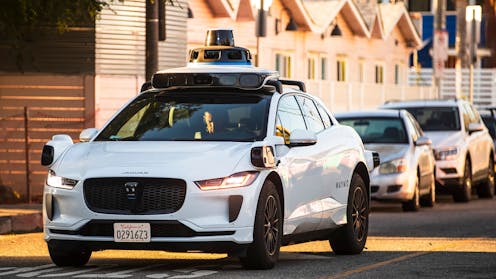Five reasons why driverless cars probably won’t take over your street any time soon
- Written by Seyed Toliyat, Lecturer in Business Analytics and Technology, University of Stirling

The UK government has launched a consultation[1] on driverless cars, ahead of on-the-road trials[2] of the vehicles next year. It has now been more than a decade since the prospect of driverless cars on public roads emerged, and prototypes and robotaxi fleets[3] such as Waymo[4] and Cruise replaced human drivers with artificial intelligence (AI).
But ten years on, and with self-driving cars increasingly common in the US and China, significant obstacles still stand in their way in the UK.
Despite rapid advances in the tech, other aspects of the driverless journey are still to catch up. Here are five key reasons why autonomous cars are unlikely to take over your local roads any time soon.
1. Uncertainties around safety
One of the main benefits of rolling out driverless cars is to increase traffic safety by eliminating driver errors. In the US, the National Highway Traffic Safety Administration[5] reported in 2018 that more than 90% of serious crashes were due to human error. But there is not yet converging evidence to support the idea that AI taking over from human drivers can make roads safer.
On the other hand, there is evidence[6] that adverse weather conditions, road design, traffic control systems and mixed traffic (that is, human-driven and driverless cars) can degrade the performance of those vehicles. Anomalies in driving patterns and frequent rear-end crashes involving self-driving[7] technologies could indicate the AI algorithms are still far from perfect.
2. Regulations and legislation falling behind
Substantial investment in research and development of self-driving technologies has led to a fast-growing and innovative industry. On the other hand, legislation and regulation[8] processes often tend to be slower. These involve multiple stages including drafting, consultation, debate, committee reviews, voting and sometimes judicial review.
The UK’s Automated Vehicles Act[9] provides a framework for the deployment of driverless vehicles. But the legal codes and mechanisms are still evolving. This is also true of data privacy[10] and cybersecurity[11].
For now, there is insufficient legislation governing who can own telematics and vehicle data or how they can be used. Such a widening lag has implications for the mass rollout of driverless cars, and has a direct impact on insuring them.
3. The insurance industry isn’t ready
Scarce data, combined with ambiguities in legislation and regulations, means insurance companies face a new set of challenges. These include making sense of where liability lies, developing new insurance models and adapting their premiums as the types of claim evolve.
In some countries, including the UK, the liability for levels four and five of autonomous driving (very highly automated and fully automated) is shifting from human drivers in conventional vehicles to the manufacturer. Although the insurer pays first, they can recover costs from the tech provider later.
New risk factors such as cybersecurity further complicate the insurance landscape. Driverless cars are designed to communicate with infrastructure and even other vehicles to decide their routes and avoid collisions. This can open the door to unlawful modifications[12], hacking or privacy breaches.
4. Ethical dilemmas
Heavy traffic and the presence of other road users could lead to scenarios[13] where a crash is inevitable. This would require programmers to design crash severity algorithms that include moral decision-making[14] into autonomous systems. In simple terms, programmers are effectively being asked to write codes that assign value to human lives – an ethical minefield that has yet to be resolved in either academia or industry.
This echoes the “trolley problem”[15] (a thought experiment about killing one person to save others) but with real-world legal and moral significance. It poses further legal and regulatory questions that could further slow the progress of legislation. Complicating things further is the opaque, black-box[16] nature of AI algorithms.
5. Changing business models
Technology developers such as Waymo and Zoox[17] offer only driverless rides and don’t sell vehicles. The recent move by Tesla[18] to launch a robotaxi service in Austin, Texas, also indicates a shift from selling cars to “mobility as a service”[19], even by car manufacturers.
In some societies like the US, there is resistance among consumers to relinquishing car ownership due to higher car dependency[20]. This mismatch between the business models of the makers of driverless cars and consumer preferences presents another significant barrier to widespread adoption.
Even if the technical obstacles are removed, these deeply held sentiments about the nature of mobility may prevent consumers abandoning private vehicles.
Until the technical, legal, ethical and commercial challenges are addressed, the widespread rollout of driverless vehicles will remain more of a long-term vision than an immediate reality.
References
- ^ a consultation (www.gov.uk)
- ^ on-the-road trials (www.fleetnews.co.uk)
- ^ robotaxi fleets (www.bbc.co.uk)
- ^ Waymo (www.forbes.com)
- ^ National Highway Traffic Safety Administration (crashstats.nhtsa.dot.gov)
- ^ evidence (www.mdpi.com)
- ^ self-driving (www.forbes.com)
- ^ legislation and regulation (www.jstor.org)
- ^ Automated Vehicles Act (www.legislation.gov.uk)
- ^ privacy (www.nature.com)
- ^ cybersecurity (www.emerald.com)
- ^ unlawful modifications (www.sciencedirect.com)
- ^ scenarios (onlinelibrary.wiley.com)
- ^ moral decision-making (ieeexplore.ieee.org)
- ^ “trolley problem” (theconversation.com)
- ^ black-box (www.nature.com)
- ^ Zoox (www.forbes.com)
- ^ Tesla (www.theguardian.com)
- ^ “mobility as a service” (assets.publishing.service.gov.uk)
- ^ higher car dependency (www.bloomberg.com)
- ^ Sign up to our daily newsletter (tcnv.link)







